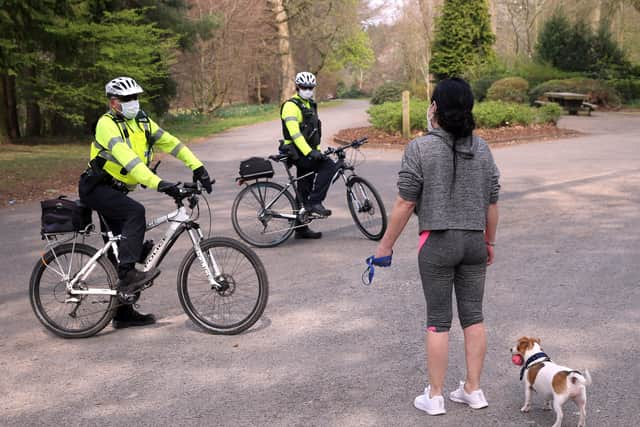Alex Kane: Recovering from the coronavirus crisis might be the harder task


I think most of us have accepted that Covid-19 doesn’t discriminate when it comes to the noses and mouths it’s prepared to enter, or the organs it’s prepared to destroy; so most of us are taking precautions of one sort or another. Even those who were originally blasé about the threat to their own lives are now keeping their distance and wearing gloves and masks.
There will be very few people who believe that they, their family or friends are somehow exempt. When the prime minister was moved to an intensive care unit I think everyone finally accepted no-one is immune.
Advertisement
Hide AdAdvertisement
Hide AdSo yes, in that particular sense, it can be said that we are all in this together. Yet the fact remains that the virus will have hugely different impacts on all of us. Those over 70 are living with a fear entirely different to the fear being felt by much younger people; because the elderly know that their chances of survival are not good. Many in their own houses are already in a 12-week lockdown and aware that it could extend for another few months if the medical/scientific evidence is deemed to justify it.


That’s a horrible way to live your life. Made more horrible because you cannot hold and hug your children and grandchildren. I know people point to the benefits of Skype and social media as a way of keeping in contact, yet I’m pretty sure most people (particularly if they are fearful) will be profoundly affected by the absence of physical touch.
The family is a crucial bond at times like this. Indeed a young friend – he is in his late 30s – told me that he misses the support and immediacy of his mum right now: “She is isolated five miles from us. I’m here to hug my children. I wish she was here to hug me. You’re never too old for a hug from mum: and mums are never too old for a hug from us.”
Millions of people will get the virus – some may already have had it without knowing – and be none the worse for wear afterwards. But their fear is for their job and also their sanity. They will be fit and well, yet unable to return to work. They may also be unable to go to a gym, leisure centre, park, beach, beauty spot, shopping centre, garden centre, cinema or theatre for weeks or months. Routine is important to most people: and upending that routine for months will result in psychological damage which will change them and their relationships.
Advertisement
Hide AdAdvertisement
Hide AdI was listening to a radio programme last week in which a dozen people were discussing what their post-virus world would look like. The one thing they had in common – and the interviewees ranged from the very well paid to minimum wage – was they mightn’t have the same job, or any job, to go back too. So, while a three-month mortgage ‘holiday’ and 80% of their salary being paid for a while lessened the immediate blow, it didn’t provide any certainties for them or their families.
These people weren’t living in fear of the virus (they all expected to survive), they were living in fear of the economic consequences of the virus. “My wife and I could get the virus and be fine and dandy in terms of illness, yet we may not have a job afterwards because we work for companies which won’t survive three-plus months of non-trading. In that case we exchange one form of self-isolation for another form – one in which we won’t be able to pay bills or have our mortgage holiday extended.”
Many of those in self-isolation won’t get the virus this time. But that doesn’t mean they won’t get it. What happens if there is a second and third surge over the next few months, or if, as some experts think, it could be well into 2021 – maybe even longer – before there is a vaccine? How do we protect those millions who don’t get it this time? When is it safe for them to return to normal life? When is it safe to have events involving large numbers of people? How much longer might we have to live with that fear?
How will frontline staff (particularly in the NHS) be in four months time? Or their families? I heard a nurse – and she looked and sounded exhausted – say: “We are trained to care and help. None of us are trained for this level of 24/7 pressure or scale of death. We may not see the long-term physical, mental or trauma toll fully emerge for years but the PTSD impact is going to be huge.”
Advertisement
Hide AdAdvertisement
Hide AdI watched a man helping to prepare mass graves. I saw film of a driver climbing down from a refrigerated lorry – which would be used for storing bodies. I heard an undertaker talking about how so many would be affected forever because they wouldn’t be able to have the closure and intimacy which the funeral of a loved one provides. I thought of all those people who wouldn’t be able to hold the hands of a dying parent or child. I thought about the politicians who would have to rebuild and restore entire countries and economies.
For all of us, what is happening right now is certainly a collective experience. Yet for all of us, each of our experiences is unique. Together, yet apart. The coming back from this crisis is, I suspect, going to be much more difficult than any of us imagine.
—— ——
A message from the Editor:
Thank you for reading this story on our website. While I have your attention, I also have an important request to make of you.
With the coronavirus lockdown having a major impact on many of our advertisers - and consequently the revenue we receive - we are more reliant than ever on you taking out a digital subscription.
Advertisement
Hide AdAdvertisement
Hide AdSubscribe to newsletter.co.uk and enjoy unlimited access to the best Northern Ireland and UK news and information online and on our app. With a digital subscription, you can read more than 5 articles, see fewer ads, enjoy faster load times, and get access to exclusive newsletters and content. Visit https://www.newsletter.co.uk/subscriptions now to sign up.
Our journalism costs money and we rely on advertising, print and digital revenues to help to support them. By supporting us, we are able to support you in providing trusted, fact-checked content for this website.
Alistair Bushe
Editor